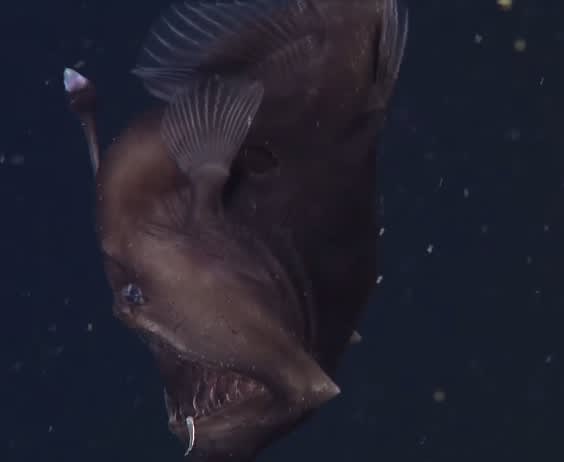Scientists Capture Rare Black Seadevil in Its Natural Habitat
OutdoorHub Reporters 11.26.14

The anglerfish known as the black seadevil more than lives up to its name. With a set of sharp, over-sized teeth and a mostly scaleless, gelatinous body, the black seadevil is the stuff of nightmares. However, you are not likely to run into this monstrous fish any time soon unless you venture into the deepest parts of the ocean. That is exactly what scientists at the Monterey Bay Aquarium Research Institute (MBARI) did to capture the first footage of a black seadevil alive in its natural habitat. They did not come back empty-handed either.
The fish was found at 2,000 feet beneath the surface—a relatively shallow depth for a species that can live up to 9,000 feet deep—and was collected for study by a remotely-operated vehicle. While the drone is not much of a fisherman, it managed to net the strange-looking fish alive and researchers are now keeping it in a cold water tank.
“Deep-sea anglerfish are strange and elusive creatures that are very rarely observed in their natural habitat,” MBARI stated on YouTube. “Fewer than half a dozen have ever been captured on film or video by deep diving research vehicles. This little angler, about 9 cm long, is named Melanocetus. It is also known as the Black Seadevil and it lives in the deep dark waters of the Monterey Canyon. MBARI’s ROV Doc Ricketts observed this anglerfish for the first time at 600 m on a midwater research expedition in November 2014. We believe that this is the first video footage ever made of this species alive and at depth.”
You can see that video below:
Beyond the sharp, glassy teeth and the malevolent grin, there is much in common between the anglerfish and anglers themselves. In fact, these elusive deep-sea critters are only one of a few other animals that have learned how to use a “fishing rod” of sorts.
“Anglerfish, like this Melanocetus, are among the most rarely seen of all deep-sea fishes,” wrote Dr. Bruce Robison on the aquarium’s Facebook. “The shining spot at the tip of the ‘fishing pole’ projecting from its head is a glowing lure. The anglerfish uses its light to attract prey in their deep, dark habitat. After capture, this specimen coughed up two fishes that it had eaten.”
Only the females have the fishing equipment, however, and the much smaller males lack even jaw teeth. Females can grow up to seven inches long but the diminutive males are lucky if they reach even one inch in length.

